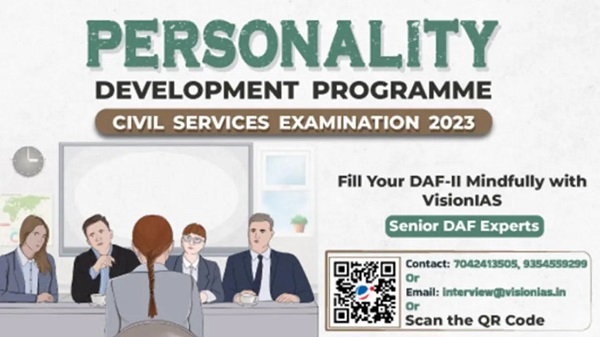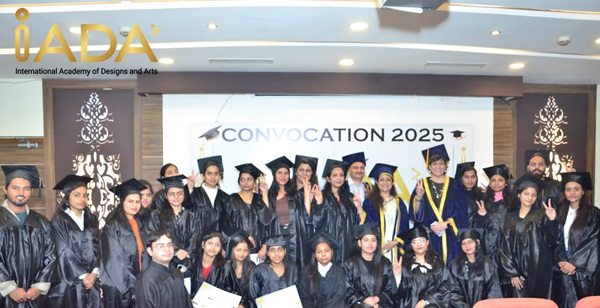The Civil Services Examination is conducted each year by the Union Public Service Commission (UPSC) to identify bright candidates to serve in the prestigious Indian Civil Services.
This selection process assesses the suitability of candidates for a career in the Civil Services based on their performance in three stage selection processes- the Prelims, Mains, and the Personality Test.
While the first two stages are designed to assess a student’s academic caliber, the Personality Test is designed to evaluate a candidate on the key personality traits that are essential to succeed in a diverse and challenging yet rewarding career in Civil Services.
Given that the Personality Test consists of 275 marks and students have gone on to score more than 200 marks, this stage plays a crucial role in a student’s success and the rank in merit list. This necessitates aspirants to give utmost attention and undertake smart preparation strategies to reflect the key personality traits sought by the UPSC Board.
Desired Traits for the Civil Services Aspirants
The Personality Test stage requires aspirants to simultaneously work on many personality related dimensions as desired personality traits form a strong foundation for a good civil servant.
It includes developing and honing qualities such as mental alertness, critical powers of assimilation, clear and logical exposition, the balance of judgment, variety and depth of interest, ability for social cohesion and leadership, and intellectual and moral integrity.
Furthermore, the UPSC panel values innovative thinking and problem-solving abilities requiring, aspirants to demonstrate out-of-the-box thinking, propose innovative ideas, and possess a talent for solving complex issues.
While on the face of it, it may seem an arduous task, a smart and integrated preparation strategy can not only help aspirants develop requisite skills and abilities but reflect them with poise, grace, and dignity in front of the UPSC Board.
The strategy should combine all aspects of interview preparation, viz, mindful filling the DAF, thorough preparation of DAF, mastery over current affairs, critical thinking and analytical abilities, developing communication skills, displaying fortitude and resilience, and many others.
Pillars of a Smart and Integrated Personality Development Strategy
Mindful Filling of the DAF: The Detailed Application Form(DAF) encapsulates key information on an aspirant’s biography, educational and professional qualifications, cadre and Service preferences, achievements, positions of distinction and leadership, and their extracurriculars and interests.
Students should be mindful to ensure accuracy and precision while providing factual information. While it is imperative that subjective pieces of information such as hobbies, interests, etc align with the personality traits sought by the UPSC.
Thorough Preparation of the DAF: Each entry in the DAF provides crucial insights into the building blocks of a candidate’s personality and how it may have evolved over time. Linking these entries to specific personality traits, for instance, recognizing the leadership potential in holding a head girl position, is essential for showcasing the best side of one’s personality.
Different aspects of the DAF listed above should be thoughtfully analyzed to understand their significance in the overall scheme of things. Probable questions and their likely answers should be developed beforehand to ensure a degree of clarity, effectiveness and cohesion in responses. This would further instill confidence among aspirants about their preparation level
Effective Communication skills: History is a witness to the profound impact of communication. Effective communication is crucial in UPSC interview as candidates are assessed on their overall personality, leadership skills, ability to handle stress and balanced viewpoints. It is important to communicate your ideas and knowledge effectively to the board.
Contrary to popular belief communication is not an ability, rather a skill that can be developed with practice. Engaging regularly in public speaking and interactive activities can significantly enhance communication skills. Furthermore, participating in elocution exercises, which focus on clear and expressive speech, can further refine one’s ability to convey thoughts effectively and confidently.
Mock Interviews: Engaging in mock interviews is a cornerstone of UPSC CSE Personality Test preparation, offering aspirants a simulated experience akin to the actual interview setting.
Experiencing a simulated interview environment helps candidates alleviate anxiety, fine-tune their responses, and adapt to the dynamics of face-to-face interactions.
- The feedback garnered from these mock interviews becomes a guiding light, offering insights into strengths and weaknesses. It enables aspirants to refine their articulation, enhance their clarity of expression, and pinpoint areas needing improvement.
- Furthermore, the mock interview process cultivates a sense of familiarity with diverse questioning styles and scenarios, bolstering candidates’ confidence and composure.
Ultimately, this iterative practice not only hones the technical aspects of communication but also nurtures the candidate’s ability to navigate unpredictable situations, a skill paramount for success in the dynamic landscape of civil services.
Role of Current Affairs: Importance and significance of recent developments of national and international importance in the interview preparation cannot be overlooked. It reflects an aspirant’s interest and curiosity in current events and also helps in informed decision-making.
Personalized Guidance and Feedback: Right guidance and feedback are other crucial preparation aspects that aspirants need while preparing for the personality test. It helps them in identification and improvement over shortcomings and build upon their competencies. A mentor can guide aspirants in developing a robust strategy, time management, identification of priority areas, and developing confidence.
Demystifying Myths About Personality Test
Demystifying myths about interview preparation is crucial for aspirants. A common misconception is that personality traits are purely innate and cannot be acquired. The truth is, that conscious efforts can develop and exhibit desired qualities. It is likely that one may encounter difficult questions during the interview process but it is important to remember that inability to answer one or even more questions is not a reflection of one’s true potential. We should have the courage to acknowledge our imperfections and willingness to improve upon them. Rather than being a strict cross-examination, the technique of the interview is of a natural, though directed and purposive conversation, which seeks to reveal the mental qualities of a candidate.
Appearing and interacting in the interview with a positive and constructive mindset can go a long way in ensuring a better interview experience and outcome by putting the candidate in a better light in front of their respective Board.
Civil Servant: A Role Model of Ethical Standards
In the civil service domain, the Personality Test serves as a crucible, evaluating not only intellectual acumen but also the ethical and moral fabric woven into the professional life of aspiring civil servants.
Beyond assessing mere compliance with rules, the UPSC seeks individuals with a moral compass and unwavering commitment to justice, emphasizing the exploration of candidates’ ability to navigate the intricate ethical landscape of governance.
Aspirants appearing for the interview round are urged to introspect, recognizing that a successful civil servant’s path is shaped not only by administrative prowess but by an unyielding dedication to upholding ethical standards, ensuring decisions align with principles of fairness, transparency, and the greater good.
As aspirants are now gearing up for the Personality Test, the key lies in embracing the process, debunking myths, and presenting a balanced personality that aligns with the ideals of public service. Mastering the UPSC CSE Personality Test demands dedication, self-reflection, and a commitment to continuous improvement.
Remember, this journey is not just about succeeding in an examination; it’s about embodying the qualities of a future civil servant. May your dedication, self-reflection, and commitment to continuous improvement shine through, paving the way for success not only for yourself but for the greater good of the nation you aspire to serve. Here’s to your aspirations, your endeavors, and the positive impact you are poised to make on the future of our nation. Best of luck!
Visit us at: https://www.visionias.in/interview/
Or Call us at: 7042413505, 9354559299




